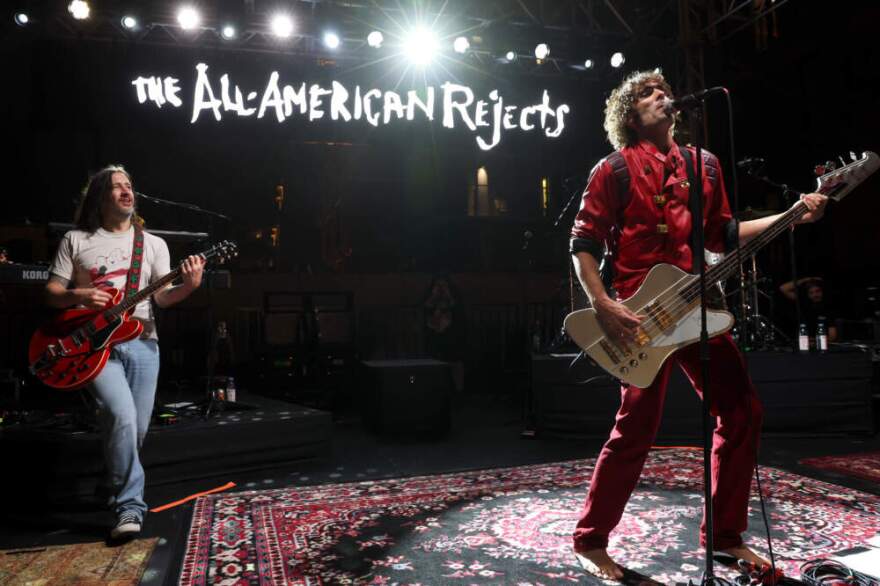
Tyson Ritter of The All-American Rejects thinks the necessity of major record labels is a thing of the past. That’s why he and the band are on their House Party Tour this summer, popping up for impromptu shows at small venues, from a gender-reveal party at a skating rink to an outdoor stage on a farm.
They’re platforming smaller, local artists while they do it, and trying to recapture what Ritter says music is all about.
The All-American Rejects started releasing music in 1999, when the band members were in high school. Ritter said he penned their 2005 breakout hit, “Dirty Little Secret,” when he was only 17.
Now, the band is releasing new music for the first time in a decade — their fifth studio album, “Sandbox”, is scheduled to come out in January of 2026. The upcoming album was the genesis of the tour, but Ritter said it’s become more significant than just promoting their work.
“It’s become bigger than the music,” he said. “Now we’re actually advocating for young artists that are starting from their garage and can’t get a promoter, can’t get a booking agent, can’t pay the ticketing fees to get even the small mom-and-pop venues.”
So far, the band has played with Oklahoma-based folk-rock band Wilderado, Nashville guitar virtuoso Grace Bowers, and California rockers TrueBlood, to name a few.
The tour harkens back to when The All-American Rejects were just kids playing music together. And Ritter said he’s working to democratize the concert experience and boil the shows down to the essence of music as a great equalizer.
“It’s kind of like this pay-it-forward movement that is surrounded by connection, community, and all under this beautiful feeling of, ‘I like music,’ and that’s something we all can agree on,” Ritter said. “In this time of division and complete polarizing division that we’re in, it feels really good to bring people together because it’s really hard right now to do that.”
Ritter said that getting a room of people together without the added restrictions of concert ticket prices or venue limitations brings the music back to its roots. And in an age of artificial intelligence, where machines can generate songs, he said it’s important to emphasize the humanity that goes into creating music.
“Music is content for most people now, and so much so that even creators on TikTok are treating it as a disposable hobby. This is art. We love it as art,” Ritter said. “You’re going to have algorithms that are making 1,000 songs in an hour that are not human-made, that are soulless.”
But even in the AI age, Ritter said the band wants to show independent artists in 2025 that there are a number of ways to reach success, not just through the traditional channel of a record deal with a major label. Ritter said he learned that from his past. The All-American Rejects signed a deal early in their career, which Ritter said felt affirming at the time, but quickly became restrictive as they lost more and more control over their music.
So, for this new album release, The All-American Rejects are doing it themselves, without the help of a major record label.
“It started in 1950 when people were given booze and $5 bills to get their songs taken away from them and let the big ivory towers pave their golden steps on the backs of artists. This is a tale as old as time — Patrons of the arts had more money. Artists were starving and were easily compromisable,” Ritter said, referring to the business model that gave music labels control over artists. “The lore of a major label record was, ‘You made it.’ It’s like a fairy tale of the poisoned apple, except the poison doesn’t hit you until you’re three records in, and for a second, everything was great. It’s like utopia-dystopia.”
While Ritter acknowledged that his band’s early-career success has allowed them to break out on their own, there are ways to make it work as an up-and-coming act. He warns of ‘360 deals,’ where a label owns a band’s merchandising, live shows, music and publishing, and he encourages newer artists not to sign those contracts.
“It wraps all the way around you like a serpent,” Ritter said, “and it chokes the life out of your art.”
Instead, he urges them to take matters into their own hands, controlling their own promotion and distribution through avenues like Kickstarter fundraising, using social media to reach more people, or hiring independent contractors for marketing and promotion.
“I think young artists have to know this before they get lured by the guy who is literally just holding the red pill and the green pill in front of you. And it’s the rest of your life that actually weighs in the balance,” Ritter said. “My advice? Trust your audience.”
____
Ashley Locke produced and edited this interview for broadcast with Michael Scotto. Grace Griffin produced it for the web.
This article was originally published on WBUR.org.
Copyright 2025 WBUR


